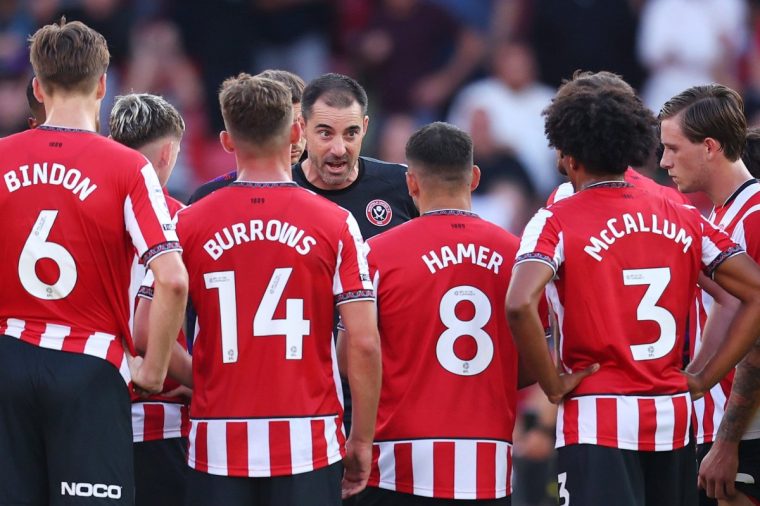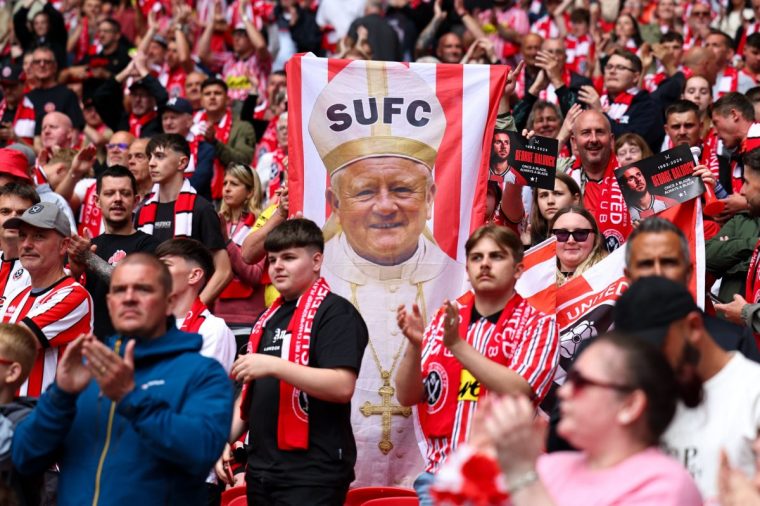The Blades have lost every league game since jumping into a bold new era in the summer – so when does everybody start panicking?
Ruben Selles might have hoped for a less pointed opening-weekend fixture as Sheffield United manager. Three months earlier, his new club had beaten Bristol City 6-0 over two legs in a Championship play-off semi-final. Now here he was, having replaced Chris Wilder, facing the same opponent. A 4-1 home defeat followed.
Three league games later, at Middlesbrough’s Riverside Stadium, chants of “sacked in the morning” were directed at Selles. If I could hear them on the back row of the West Stand, he could hear them by the pitch. That ditty is usually proffered by crowing home supporters towards an under-pressure coach, but not here. The song came from Sheffield United supporters.
Several minutes later, Wilder’s name was on the same lips. Whether the away end wanted him back or were merely impressing upon Selles that his predecessor had not failed doesn’t really matter. If this was supposed to be a new era of Sheffield United, one guy from the recent past continues to cast a long shadow.
Everything has changed at Bramall Lane. In December 2024, American consortium COH Sports took complete ownership of the club and promised to transform the club using “innovative recruitment” and “analytic strategies”, which later turned out to be an AI-led data recruitment model.
If Wilder doesn’t seem an obvious fit for that climate to you, have a shiny penny. He was sacked in June and replaced by Selles, who worked as a data analyst before his coaching career.
 Sheffield United are bottom of the Championship under Ruben Selles (Photo: Getty)
Sheffield United are bottom of the Championship under Ruben Selles (Photo: Getty)
One interpretation of COH Sports’ approach (and this is genuinely meant without sarcasm) is that it is very courageous. Given similar conditions – some player trading but roughly the same squad shape, potentially weaker title challengers than in 2024-25 – Wilder would likely have challenged for automatic promotion.
The blueprint was right there: Leeds United finished third on 90 points, lost the play-off final, kept their manager and won the title; Sheffield United had done exactly the same until the manager bit.
Even if Wilder had often relied upon winning tight games with a moment of magic rather than all-out dominance, his record created pressure for any successor.
Instead, Sheffield United’s new owners believed that the introduction of new recruitment processes and a head coach who better fit their ideals (and would maybe be less grumpy about criticising them in public) was the right solution. Their club, their call.
Selles is certainly struggling. Sheffield United, pre-season second favourites for the title, are the only EFL club without a point and are the only EFL club not to score more than a single goal.
They are below Sheffield Wednesday, who probably assumed that they had a monopoly on Steel City nightmares. They have one goal from 50 shots and only three clubs in the Championship have faced more shots on target.
At the Riverside, the problem isn’t that Selles’ team are shambolic but that they are nothing at all. There doesn’t seem to be an obvious plan to create clear chances despite them possessing excellent attackers and attacking midfielders. They operate with a high defensive line but the press can’t cause enough issues and so Sydie Peck gets overrun in midfield.
Selles spoke of vertical, aggressive football but his team are conceding goals without scoring them. Even allowing for teething problems, this is worrying.
Wilder’s success will always hang over Bramall Lane. He gave them some of the more unexpectedly brilliant times of their lives and, rather than get rapid promotion to an elite club, he left, came back and threatened to do the same thing again.
 Chris WIlder remains popular at Sheffield United (Photo: Getty)
Chris WIlder remains popular at Sheffield United (Photo: Getty)
For as long as he remains out of work, some supporters will wonder if the baby has been thrown out with the bathwater. That’s particularly true if Selles is the opposite and it’s not working.
The structure above Selles also warrants scrutiny. To what extent Sheffield United’s “AI model” is them blindly following recommendations or merely using tech to filter through performance data to create longlists (which is not unusual) is unclear, but they are using a company called shortcircuit.science, a company founded by James Bord. The club’s recruitment over the last nine months has been… intriguing.
In January, a few weeks after the takeover, Sheffield United paid around £2m for Jefferson Caceres (a 22-year-old from Peruvian club Melgar) and Christian Nwachukwu (a 19-year-old Nigerian winger from Botev Plovdiv in Bulgaria).
This summer, they signed Ehije Ukaki, another Nigerian winger from Botev Plovdiv, and Mihail Polendakov from Septemvri Sofia for around a combined £1m.
Caceres has since joined Dunfermline on a permanent deal, a club now co-owned by Bord. None of these four players have yet played a league minute for the club.
In the post-Brexit age, Championship clubs now have a number of Elite Significant Contribution (ESC) places that they can use on players who fail to meet usual requirements for a visa.
“Usually, clubs use these places on players who will improve either the ceiling or the floor of their first-team squad,” says Andy Watson of GBE Expert Hub.
“They don’t typically use them on teenagers from lower-profile leagues. This can work, as long as they either become big players at your club or are sold for profit. But otherwise they are taking up a valuable space.”
Caceres’ departure – presumably for much less than the fee paid – created a space for Nils Zatterstrom, signed from Malmo for a reported £2.5m. When one local journalist picked his end-of-window matchday squad, central defender Zatterstrom did not make the bench.
That is because the transfer strategy seemed to shift entirely, presumably in panic in response to the start to the season on the pitch and criticism from Selles about the lack of movement, particularly regarding the lack of Championship experience.
Until 26 August, Sheffield United signed four players on permanent deals aged 18, 20, 20 and 22. Between 27 August and 1 September, they signed six more players on permanent deals including Danny Ings (33) and Ben Mee (35).
United have secured the signature of proven Premier League and Championship goalscorer, Danny Ings. ✍️
— Sheffield United (@SheffieldUnited) August 27, 2025
Japhet Tanganga and Tahith Chong were smart EFL recruits, as was Chiedozie Ogbene on loan from Ipswich and Ben Godfrey from Atalanta. Alex Matos, signed on a permanent deal on deadline day, was a data-driven signing.
As such, Selles probably deserves some time to see how he makes a team out of it all. The expectation is that a back three (Sheffield United have lots of central defenders) with wing-backs can work, but only if Selles accepts that his central midfield is being overrun.
Does Mee fit a high defensive line? Can Ings press from the front? If, as many supporters suspect, the manager is out of his depth here, he will not last much longer.
There is an uncomfortable irony to all this: the first season of Sheffield United’s new age of intended smart long-termism coincides with exactly the season during which a short-term approach would be the most understandable.
Your next read
This is the last year for which the club will receive parachute payments. Fail to go up and things get immeasurably harder. You become one of the rest.
Right now, that rest are all above Sheffield United and it’s hard to know what the exact plan is or where they go next.
Is the AI transfer model gone (it presumably didn’t throw up Ings and Mee alongside teenage wingers from the Bulgarian league)? Is Selles a dead man walking?
And are the new owners prepared to ignore the nagging sense that plenty of fans have that Wilder might have loved to have this squad?
